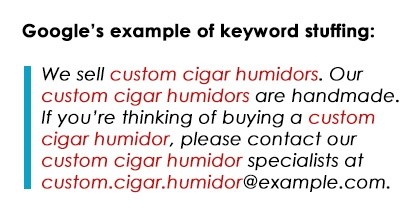Why Does Your Website Keep Getting Penalized by Google?

It’s a question we hear all too often. Google ban reasons are numerous and often completely arbitrary, so it’s natural to wonder why your service or website was disciplined by the tech giant. There are ways to mitigate this and even to reinstate your services, but all too often does the hammer crackdown harder than most people expect. This article will show you what you need to know when it comes to Google ban reasons and what you can do to prevent them from happening.
Table of contents:
- Can You Get Banned from Google?
- What Types of Penalties Are There?
- Why Does My Website Keep Getting Penalized?
Can you get banned from Google?
As a matter of fact, you can. Quite easily! Because Google is the controller of all accounts and services, they are the sole arbiters in deciding whether or not to ban an account. The full terms of service for Google accounts can be found here, including the most important line from that long article:
“We may suspend or stop providing our Services to you if you do not comply with our terms or policies or if we are investigating suspected misconduct.”
This effectively gives Google free reign to conduct themselves however they wish, since concepts like “misconduct” are entirely their prerogative to define. This means that you better be on your best behavior, or Google can take your account away! The Google Search Engine is not a lawless Wild West and there are definitely rules (as defined by Google), so moderation practices can and will affect you if applicable.
So what are the rules?
1. Avoid Irrelevant Keywords. If your website is about pizza, why are you keywording for “computer software deals?” Google understands this and will crack down accordingly.

2. Don’t deliver viruses. This one seems simple enough: don’t have viruses on your website or any other malicious code.
3. Don’t buy mass traffic. Doing so flags your site and gets Google’s hackles up because it “cheats” the system and gets you “unearned” view counts. Google uses robust tracking software to find people using botting services such as mass traffic purchases and knows exactly what to look for. If you want more traffic coming to your site, try resources like these to aid you!
4. Don’t use automated inquiries. Automated usage of Google is very much frowned upon. If Google detects you are using an automated system to perform inquiries, they will most certainly blacklist you.
5. Don’t “scrape” content. This means you shouldn’t just copy/paste content on the web to your own site or use an automated process that does something similar. Google doesn’t like it when people’s content is stolen. Taking sections as quotes is fine, but all too often do people steal entire websites and claim them as their own.
6. Don’t use “crawler-friendly” websites that are not tailored to an actual user experience, but instead tailored to ranking as high as possible on the algorithm’s checklist. Google can see through these attempts at inflating your rank and will act accordingly in order to dissuade you from doing so again in the future.
7. Don’t Hide Adult Content. This one is obvious – if your website has adult content of any kind, it needs to be explicitly disclaimed at the moment you load the page. Google ban reasons are looking for the suspicious, especially if it borders on the illegal. Being upfront and disclosing everything your website does upfront is the most important thing you can do, especially if your main business involves adult content.
What types of penalties are there?
Google can enact a variety of policies when it comes to disciplining accounts. Mostly, these fold into two categories, being Algorithm and Manual penalties. Proper SEO practices take time, so dealing with either of these penalties can have a dramatic effect on your overall work output.
Manual Penalties
These penalties are doled out from an official Google employee tasked with this very job, and who spends their time looking for sites that violate the guidelines they have laid out in their Terms of Service. They have a lengthy search guideline page that should be consulted anytime one is worried about the rules. Google ban reasons are usually very simple and these employees will let you know.
Algorithm Penalties
These penalties are automated and trigger when your website is found by one of the many algorithms running on Google’s platforms at any given moment. One such example, the Panda algorithm looks for duplicate content on the web to flag. These penalties are difficult to work with since they were given to you by an automated process. This means that you may have issues trying to rectify the situation if you believe they were given to you by mistake.
Why does my website keep getting penalized?
Sometimes it’s tricky to fully understand why your website is getting negative attention from Google, so fixing things becomes extremely difficult. You may want to double- and triple-check your website to make sure you aren’t hosting anything Google doesn’t appreciate – such as undisclosed adult content, malware, or stolen content. From here, if you believe you should be in the clear with no penalties whatsoever, it pays to contact Google directly and try your best to hear from a representative. Talking to a flesh and blood person is often key to clear up misunderstandings and abiding by any suggestions made.
How to Avoid Being Banned from Google
The most important thing to consider when thinking about how to keep your account active is to simply read the TOS and any other rules that you might have to interact with. Google does a pretty good job of keeping its rules visible and accessible, ensuring that you can do your due diligence. By following their guidelines, you can rest assured that you will most certainly not face any actions on your account. If you try to play fast and loose with the rules, you may face repercussions that you did not intend.
You can also make sure that you do the opposite of the rules previously posted: in other words, make sure your site has genuine, unique content for example. Make sure visitors to your site understand it and clearly mark any adult content you host. Don’t use any automating software that scours Google’s sites. Don’t do anything illegal or harmful, and don’t host any malware. So if you’re still wondering, “why my website keeps getting penalized by Google,” you should first look towards these basic rules. If you follow them to the letter, your account should never see any penalty.



